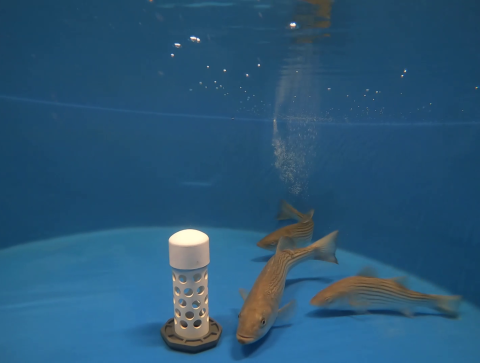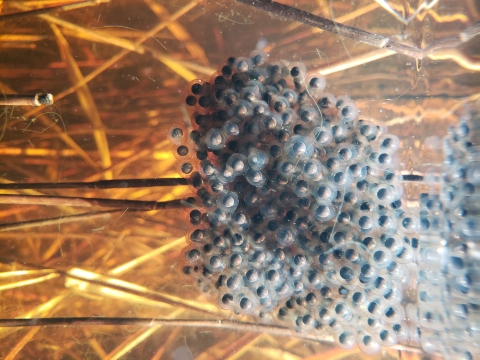Projects and Research
Atlantic Striped Bass:
In a cooperative effort, the state of North Carolina and Edenton National Fish Hatchery have a genetic monitoring program for striped bass released from the hatchery. When the broodstock broodstock
The reproductively mature adults in a population that breed (or spawn) and produce more individuals (offspring or progeny).
Learn more about broodstock (future parents) arrive at the hatchery, staff collect a small piece of fin from each adult fish. Once broodstock have spawned, our staff collect their eggs, raise juvenile fish to size, and release them into the North Carolina Rivers from which their parents were collected. Scientists specializing in genetic testing analyze the fin samples. When striped bass are caught as part of their monitoring program, the state of North Carolina biologists can determine whether the fish had parents who spawned at Edenton National Fish Hatchery. This information is important to determine the hatchery’s contribution of striped bass caught in the ocean and/or the rivers in North Carolina.
Lake Sturgeon:
Fish biologists at Edenton National Fish Hatchery are studying options for food items for lake sturgeon raised at our hatchery. In the years past, our staff have fed the lake sturgeon a diet consisting mostly of frozen midge (an insect) larvae imported from China. Currently, we are conducting trials other food items such as a sturgeon diet imported from Europe.
Cape Fear Shiner:
The Raleigh Endangered Species Field Office, the state of North Carolina, and Edenton National Fish Hatchery are combining efforts to restore the endangered Cape Fear shiner. These fish only exist in the piedmont of North Carolina (nowhere else in the world!). With initial help from Conservation Fisheries International, hatchery staff will continue refine techniques to spawn and grow these fish in captivity to bolster the numbers of fish in the wild.
White Shiner:
In another cooperative effort, the Raleigh Endangered Species Field Office, the state of North Carolina, and Edenton National Fish Hatchery are working to support endangered mussels and the hatcheries that grow them. An important step in growing mussels is matching the mussels with a compatible fish species. Without this step, the larval mussels cannot grow and mature. Edenton National Fish Hatchery was the first known to produce white shiners in a captive setting. Our hatchery provides reliable and healthy host fish for our mussel restoration partners.
Gopher Frogs:
Gopher Frogs are listed by the state of North Carolina as endangered and they are under consideration for federal listing under the Endangered Species Act. Only 7 of 23 historical populations of gopher frogs have been documented in North Carolina. One such population is in the Croatan National Forest. Today, there are only an estimated 70 breeding adults left. Edenton National Fish Hatchery have teamed up with the NC Wildlife Resources Commission (NCWRC), North Carolina State University's Center for Marine Technology (CMAST), and the US Forest Service to boost numbers of gopher frogs in Croatan National Forest.


